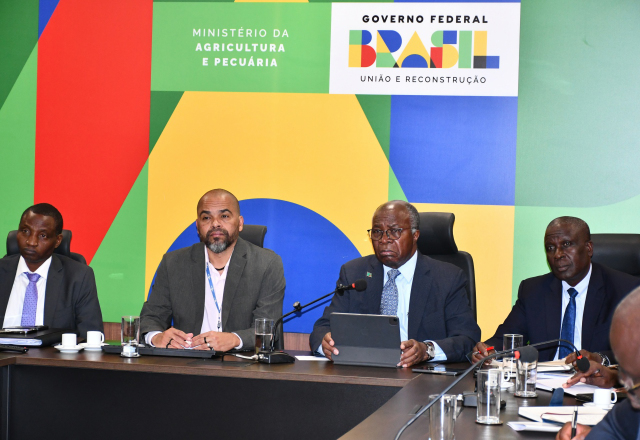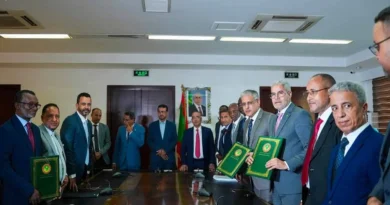Zambia Makes Urgent Appeal to Brazil on Lobito Corridor Investments
The Government of Zambia has launched a high-level appeal to Brazilian investors, urging them to capitalize on transformative investment opportunities linked to the Lobito Corridor Railway Development and a parallel agricultural expansion programme. The call was made by Zambia’s Minister of Finance and National Planning, Dr. Situmbeko Musokotwane, during an investment engagement session in Brazil this week.
Speaking at a session with the Banco Nacional do Desenvolvimento Econômico e Social (BNDES) and hosted by the Brazilian Ministry of Agriculture, Dr. Musokotwane highlighted the Lobito Corridor as a game-changing project that will connect Zambia and the Democratic Republic of Congo to the Atlantic Port of Lobito in Angola. The corridor, he said, is poised to revolutionize trade, boost logistics efficiency, and integrate Southern and Central Africa’s economies.
“This is not just a transport project,” Dr. Musokotwane said. “It is a gateway to unlocking agricultural, mining, and industrial potential across Zambia and the wider region. We are calling on Brazilian investors to partner with us in transforming this corridor into a world-class logistics and agricultural value chain hub.”
He outlined Zambia’s strong economic fundamentals—including a projected 6% GDP growth in 2025, a population of over 20 million, and preferential access to over 1.4 billion consumers across SADC, COMESA, and AfCFTA. These, he emphasized, make Zambia an attractive destination for investment in production, processing, and distribution.
During the high-level engagement in Brazil, Dr. Situmbeko Musokotwane, Zambia’s Minister of Finance and National Planning, outlined three strategic opportunities for Brazilian investment under the Lobito Corridor initiative.
He highlighted the need for investment in the construction, maintenance, and efficient operation of the Lobito Corridor railway line. This corridor, which connects Zambia and the Democratic Republic of Congo to Angola’s Atlantic Port of Lobito, is expected to play a transformative role in facilitating cross-border transportation and trade across Southern and Central Africa.
Dr. Musokotwane pointed to Zambia’s 43 million hectares of arable land and abundant freshwater resources as a strong foundation for agriculture-led growth. He invited Brazilian investors to explore opportunities in large-scale farming, agro-processing, and export-oriented production. The agricultural zones linked to the Lobito Corridor, he said, present enormous potential for value-added investments that can serve both regional and global markets.
The Minister also encouraged Brazilian Development Finance Institutions (DFIs) to consider equity participation and technical support for corridor-linked projects. He emphasized the importance of concessional and commercial financing, alongside technology transfer, to ensure the success and sustainability of infrastructure and agricultural developments in Zambia.
He further proposed equity participation by institutions like BNDES in the corridor’s development structure and encouraged Brazilian agribusinesses to explore opportunities in Zambia’s agricultural zones connected by the corridor.
Speaking on behalf of the Brazilian Ministry of Agriculture, Livestock and Food Supply (MAPA), Mr. Caesar dos Santos expressed Brazil’s commitment to facilitating engagements between the two countries. “We are available to develop Memoranda of Understanding to advance cooperation in agriculture,” he stated. “The way forward includes both government and private sector collaboration.”
BNDES representative Mr. Henrique de Azevedo Avila echoed this sentiment, noting that the Bank could support the export of Brazilian machinery tied to investments in Zambia. “While investment decisions rest with private entities, BNDES can finance equipment exports if a Brazilian manufacturer wins the bid,” he explained.
Zambia’s Minister of Agriculture, Mr. Mtolo Phiri, emphasized agriculture as a cornerstone of the country’s economy and welcomed Brazilian joint ventures. “We are encouraging serious joint ventures between Zambian and Brazilian firms to enhance productivity along and beyond the Lobito Corridor,” he said.
The Zambian delegation also engaged with Brazil’s renowned EMBRAPA and discussed developing an agriculture master plan for the Lobito Corridor. Dr. Musokotwane confirmed that interim and feasibility studies for the railway were completed in 2024, with Memoranda of Understanding signed for 470,000 tons of mining freight. Contractor selection is expected by January 2026, with financial closure anticipated by the end of that year.
The African Development Bank and Africa Finance Corporation have each pledged $500 million, while the European Union, led by Italy, has pledged €320 million to the project. However, Dr. Musokotwane stressed that financial closure has not been reached, leaving room for Brazilian investors to participate meaningfully.
“Let’s develop relationships now,” he urged. “Be part of this movement to unlock Africa’s minerals, agriculture, and economic potential.”
The Zambian delegation to Brazil includes top officials from the Ministry of Finance, the Ministry of Agriculture, the Presidential Delivery Unit, and Zambia’s Embassy in Brazil. Also present were technical experts and representatives from the World Bank’s Zambia office.



